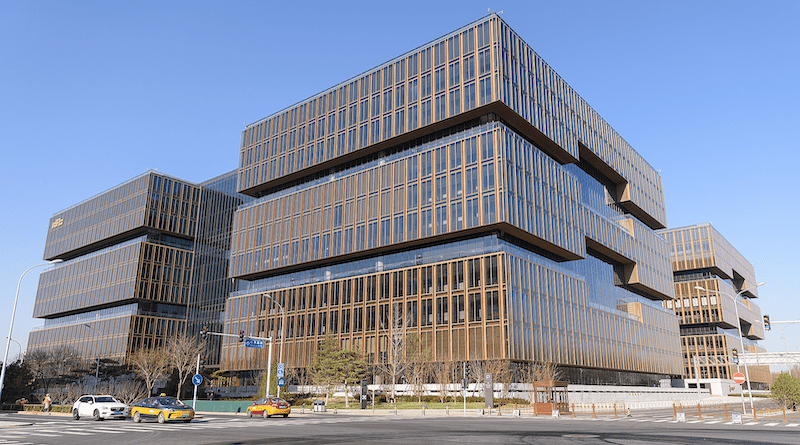Canada Freezes Ties With China Development Bank
By RFA
By Chris Taylor
Canada has frozen ties with China’s Asian Infrastructure Investment Bank after the bank’s Canadian communications head resigned, explosively accusing the organization of having “one of the most toxic cultures imaginable” on his personal Twitter account.
Chrystia Freeland, Canada’s finance minister and deputy prime minister, told reporters on Wednesday, the Canadian government would “immediately halt all government-led activity at the bank,” while it reviewed the allegations and Canada’s “involvement” with the AIIB.
Bob Pickard, the Canadian director-general for communications of the Beijing-headquartered AIIB, said he flew to Tokyo on Wednesday, two days after formally resigning, out of concern for his personal security.
“I’ve been advised not to set foot in China anytime soon. From a country where the two Michaels were kidnapped by the government, we’re maybe a little more sensitive or concerned about such things,” he said in a phone call to Reuters, referring to two Canadians arbitrarily detained in China for nearly three years from 2018 to 2021.
The Party holds the cards
“The Communist Party hacks hold the cards at the Bank. They deal with some board members as useful idiots. I believe that my Government should not be a member of this PRC instrument. The reality of power in the bank is that it’s CCP from start to finish,” Pickard wrote in a tweet.
He added, “I saw with my own eyes the extent to which Communist Party hacks occupy key positions in the bank, like an in-house KGB or Gestapo or Stazi.”
The AIIB said in a statement, “Mr. Pickard’s recent public comments and characterization of the Bank are baseless and disappointing.”
The Wall Street Journal reported having seen an email by Jin Liqun, the bank’s president and a former Chinese deputy finance minister, which said to staff on Wednesday, “We acknowledge the uncertainty these comments can cause for all of us that work at AIIB. We hope that you will join us in wishing Bob well for the future.”
Jin has been busy burnishing the AIIB’s reputation, distancing the bank from the likes of Beijing’s Belt and Road Initiative, which is seen by many critics as simply an extension or a tool of China’s foreign policy.
“We are proud of our multilateral mission and have a diverse international team representing 65 different nationalities and members at AIIB, serving our 106 members worldwide, many of whom have been with us since our formation in 2016,” the AIIB’s official statement on Pickard’s resignation said.
The allegations and the reaction by the Canadian government are likely to be an embarrassment to the AIIB, which has been representing itself as a transparent alternative to multilateral organizations such as the Asian Development Bank, the World Bank and the International Monetary Fund.
It also underscores tensions between the West and China over international development lending, with China frequently being forced to deny accusations of “debt diplomacy” involving its Belt and Road initiative.
But Austin Strange, a specialist in China’s international-development finance at the University of Hong Kong, told the Wall Street Journal ina separate report that unless further member-states raise similar concerns it is unlikely there will be any major consequences for the bank.
‘Nothing but a lie’
The Chinese embassy in Ottawa told Reuters in an email: “The claim that ‘AIIB is controlled by the Communist Party of China’ is nothing but a lie”.
A spokesperson for the Chinese embassy in Canada said in a statement that Pickard’s comments were purely “a sensational publicity stunt.”
Meanwhile, Pickard told the Financial Times from Tokyo, “These people are like an invisible government inside the bank and this is what I can’t be part of.”
Although the response from the AIIB has been measured, Pickardclaims that China’s wumao bots – state-sponsored internet commentators – have been accusing him online of variously being an “Imperialist” and a “spy,” but nobody has suggested that such messages are coming from the AIIB itself.
Zichen Wang, a senior Beijing-based reporter for Xinhua, in his widely read Pekingnology blog on Friday noted inconsistencies in Pickard’s statements about the inner workings of the AIIB, and also noted that some AIIB employees said in media reports that Pickard’s claims “came as a surprise.”
Wang further cited the fact that India is AIIB’s biggest beneficiary despite the fact that “China-India ties have dived after the unfortunate 2020 border clash, which killed 20 Indians and 4 Chinese soldiers,” as evidence of the bank’s independence from China’s foreign policy.

